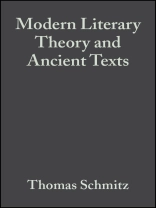This book provides students and scholars of classical literature
with a practical guide to modern literary theory and criticism.
Using a clear and concise approach, it navigates readers through
various theoretical approaches, including Russian Formalism,
structuralism, deconstruction, gender studies, and New Historicism.
* Applies theoretical approaches to examples from ancient
literature
* Extensive bibliographies and index make it a valuable resource
for scholars in the field
Jadual kandungan
Acknowledgments.
Acknowledgments for the English Translation.
Introduction.
What Is, and To What End Do We Study, Literary Theory?.
Literary Theory and Classics...
Mengenai Pengarang
Thomas A. Schmitz is Professor of Greek Language and Literature at the University of Bonn, and is one of the founding members of the Centre for the Classical Trad...












